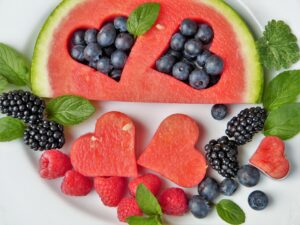But how to find your way through the blizzard of information about diets and nutrition? There are so many different voices on the subject, whose advice should you follow?
It’s not difficult if you put common sense to work. Here’s a few tips:
Eat foods that are as close to their natural state as possible, i.e. unprocessed foods. Whole potatoes instead of potato chips, whole oatmeal instead of cold cereal, whole grain flour instead of white flour; you get the idea. Processed foods have most of their nutritional value removed in the refining process. These highly processed foods are sometimes referred to as “white foods” (white flour, white sugar, white bread, etc.). They are nothing but empty calories, filling you up but leaving your body under-nourished and still hungry.
Avoid anything that is man-made and artificial, i.e. artificial sweeteners, margarine, diet soda, etc.; anything that would be considered “fake”. These fake foods are completely devoid of any real nutrition and not really food at all. The rule here is, if it is something you can’t grow (pick from a tree or plant), hunt, or get from an animal (i.e. eggs, milk) DON’T EAT IT!
Eat the rainbow. That means you get lots of brightly colored fruits and vegetables in all the colors of the rainbow daily. There’s ample evidence to support the health benefits of a diet rich in fruits and vegetables. These foods are an important source of vitamins and minerals that serve as co-factors for many metabolic processes, including brain and nervous system function.
Make sure you get adequate protein. In addition to building tissue, protein provides the building blocks for neurotransmitters (the chemical language of the brain) and hormones (chemicals that carry messages to your organs) which play a key role in how you function mentally and emotionally.
Eat adequate healthy fats. Fats are not the enemy, as we once assumed. Fat nourishes the brain and is also an important ingredient in the production of hormones. Healthy fats include olive oil, butter, coconut oil, avocado and animal fats. Taking a supplement that provides essential fatty acids (omega-3) is especially helpful for healthy brain function.
Drink plenty of pure, clean water. Over half of your body is made up of water! Water nourishes joints, protects the brain and spinal cord, helps regulate body temperature, and assists with waste removal. Drinking milk, juice or soda does not count. In fact, you should avoid anything high in sugars, even natural ones (i.e. soda, juice) because they cause a cycle of sugar high followed by sugar low, and these fluctuations in blood sugar drastically affect mood and mental function.
Hidden food allergies can also affect mood and mental function. Common food allergies include wheat, gluten (a protein found in many cereal grains), dairy products, eggs, corn, soy, chocolate, tree nuts, and others. If you suffer with depression, mental fog, or mood swings, it’s worth looking into this as a possible cause.
Finally, realize that our food supply is not what it was 100 years ago. Depleted soil produces crops that are not as rich in vital nutrients as they once were. Specific nutrients have been identified as being helpful for mood disorders. Taking a vitamin and mineral supplement may ensure that you get all of the nutrients you need. Ask a natural health care professional for advice about this.
This page contains the opinions of the author. You should consult a medical professional about the ways your diet may be affecting how you feel and get expert advice before making any changes to your diet or supplements.
Find a functional medicine practitioner in your area:
https://kresserinstitute.com/directory/
Books to learn more:
Dr. Mark Hyman is a functional medicine doctor that has pioneered a holistic treatment course for what he calls the “broken brain”. This plan encompasses protocols for depression and anxiety.
The Ultramind Solution by Mark Hyman, M.D.
The Ultramind Solution Companion Guide by Mark Hyman, M.D.
DISCLOSURE: These book links contain Amazon affiliate codes. As an Amazon Associate I earn from qualifying purchases.
From the experts:
The Broken Brain website: https://brokenbrain.com/
Dr. Mark Hyman’s website: https://drhyman.com/
 How you feel is directly linked to what you put in your body. A brain that is fueled by a poor diet is going to function poorly. Unfortunately, the SAD diet (Standard American Diet) is nutritionally poor and loaded with harmful substances; bad fats, sugar, artificial ingredients and chemical additives.
How you feel is directly linked to what you put in your body. A brain that is fueled by a poor diet is going to function poorly. Unfortunately, the SAD diet (Standard American Diet) is nutritionally poor and loaded with harmful substances; bad fats, sugar, artificial ingredients and chemical additives.